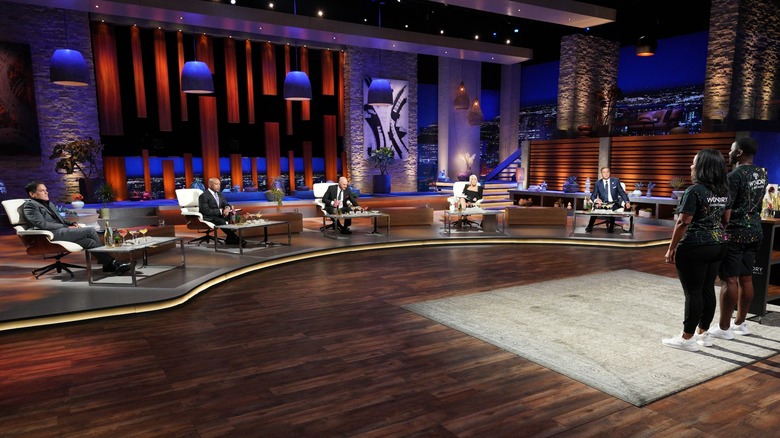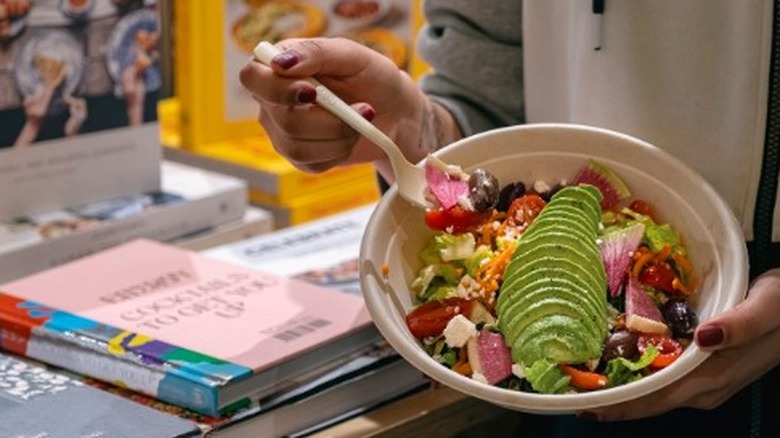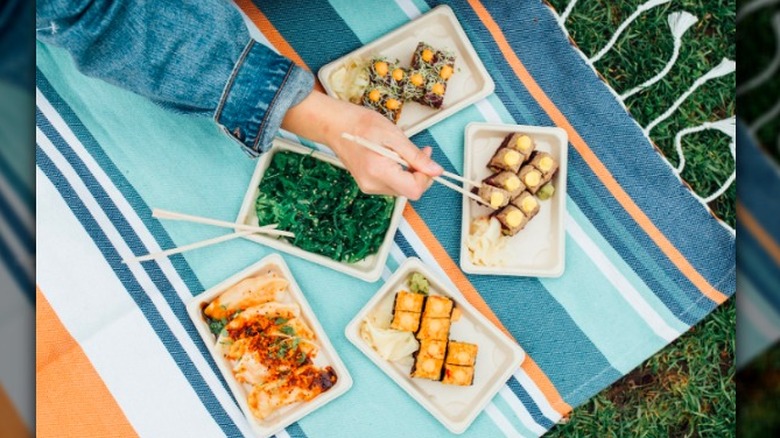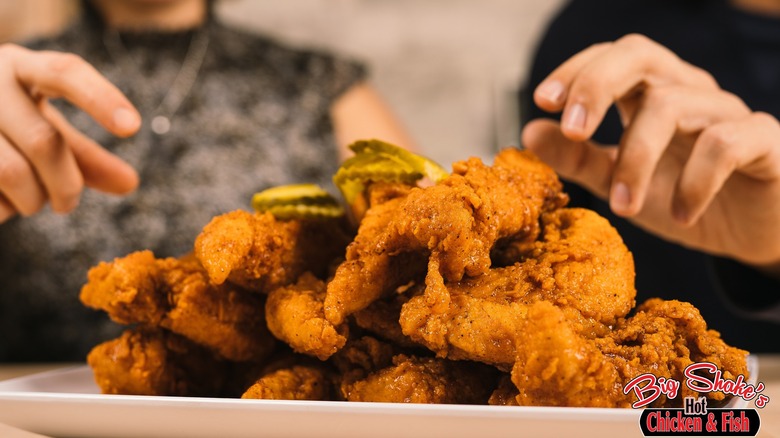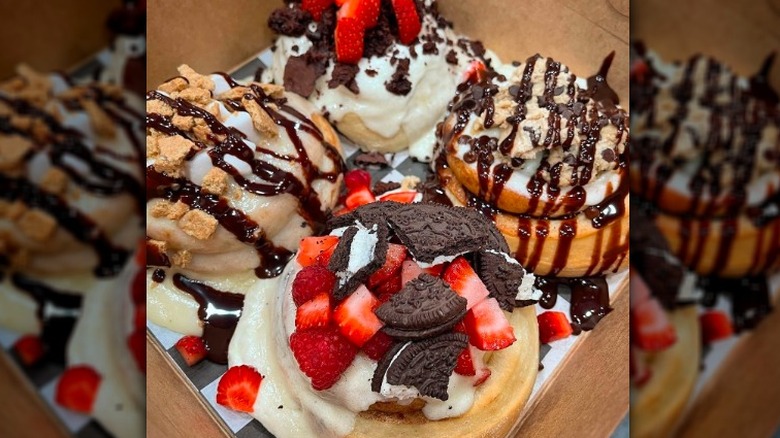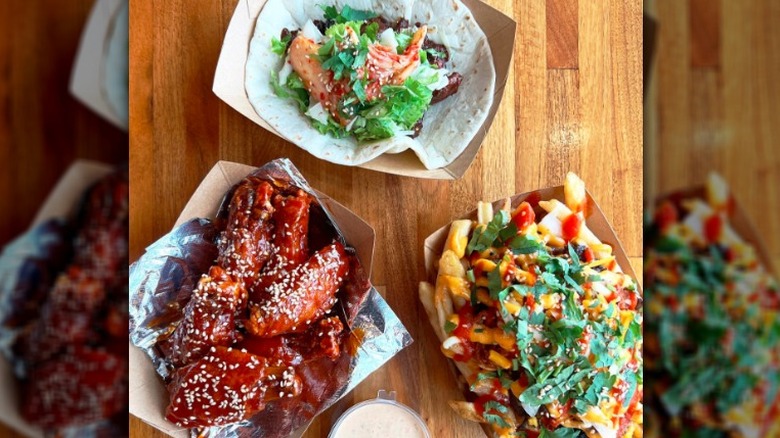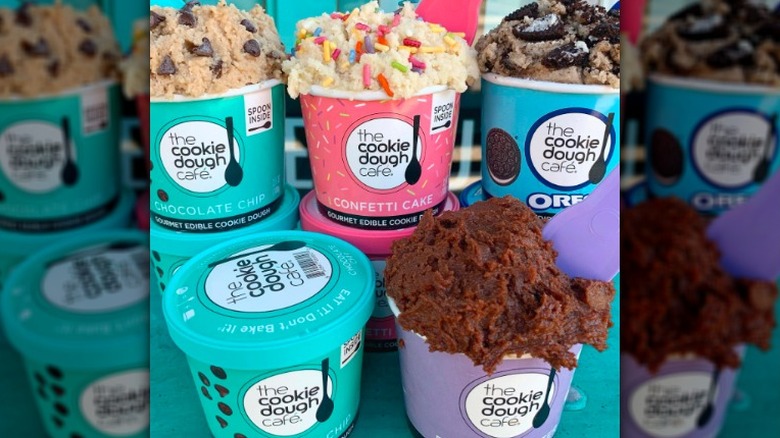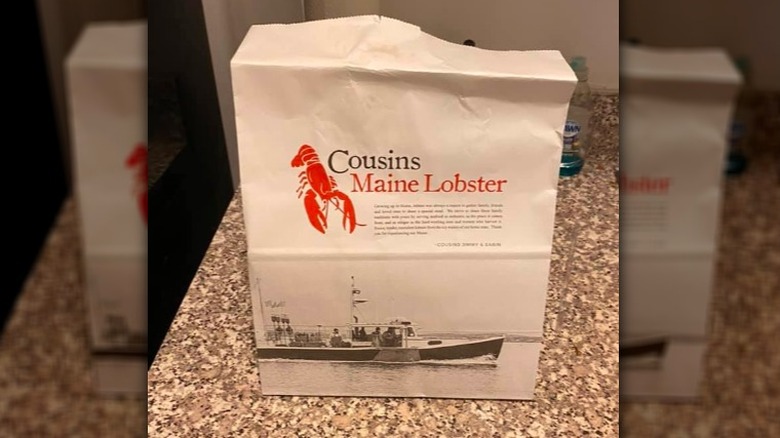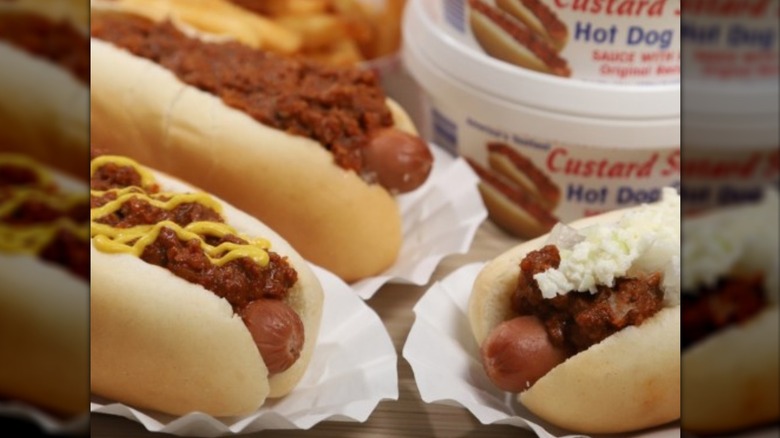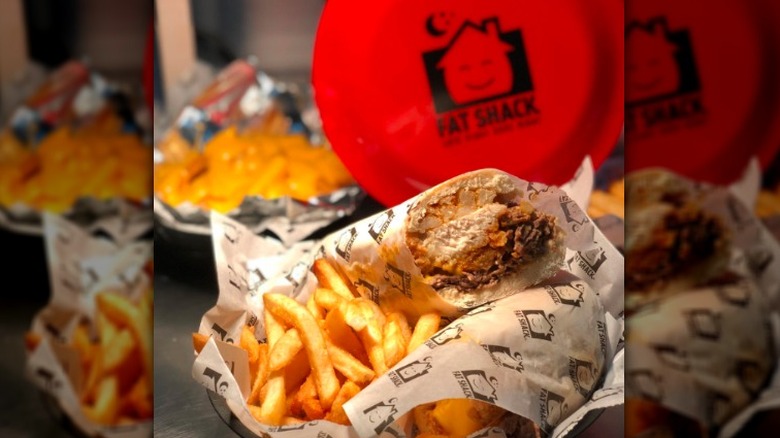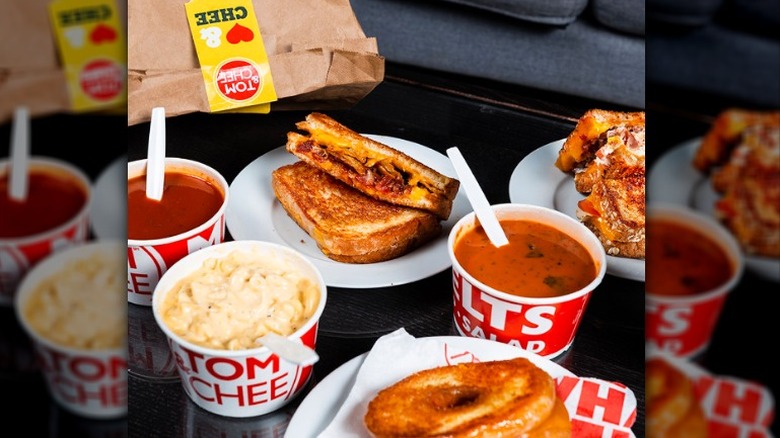10 Restaurants That Found Success After Shark Tank
Do you have a fear of swimming with sharks? We're not talking about the ocean creatures with razor sharp teeth and those recognizably terrifying dorsal fins that protrude from the water. We're talking about sales sharks — sales people who have an unending appetite for a great investment. These are the people who have the innate ability see potential dollar signs from miles away and attack them head-on so no one else can get a nibble. Well, if you're an entrepreneur looking for investors and you don't have a fear of jumping in the metaphorical pool with these kinds of people, then landing a spot on the ABC hit show "Shark Tank" might just be the greatest opportunity you'll ever receive.
"Shark Tank" allows real-world entrepreneurs to chat with a panel of hugely successful investors to see if any of the Sharks (as the inventors call themselves) are willing to help fund their dreams and aspirations. As you can imagine, the Sharks badger them with questions ranging from profit margins to personal motivations, and business owners do their best to wow the investors during the intense grilling. Some business owners immediately cave to the pressure and walk away with their heads held down. However, others show up with their game faces and earn themselves a lucrative partnership. And then there are some entrepreneurs who advance their businesses without investment from a Shark — the appearance alone did them good. Here are 10 restaurants that found success after "Shark Tank."
Avocaderia
Avocados have been stealthily making their way into more dishes on menus, and that's a great thing. They have a creamy texture that pairs well with a ton of other ingredients, and they contain a bunch of healthy fats our bodies need, per Harvard T.H. Chan School of Public Health. Avocados are an awesome ingredient, and that's why a man named Alessandro Biggi opened up an avocado-themed restaurant called Avocaderia. This place serves the fruit in almost every way imaginable. It even has a burger that uses two avocado halves as the bun! So, Biggi brought his passion for the "alligator pears" to the big stage on "Shark Tank" in hopes he could get funding to grow his business.
Biggi entered the tank in the episode that aired in February 2018 hoping to receive $300,000 for 10% of the company, per Shark Tank Blog. He brought some samples so the Sharks could actually taste the food they'd potentially invest in, and it went over quite well, which was a great sign. He then discussed his future goals with the Sharks and where he saw the Avocaderia brand several years into the future. A few of the Sharks immediately bailed out for various reasons, but Mark Cuban and Barbara Corcoran ended up in a back and forth with Biggi until they all agreed to a final investment of $400,000 for 20% of the company (per CNBC) that now has four locations in New York City, per Shark Tank Blog.
Beyond Sushi
One of the most visually stunning foods is sushi. If you've ever spent time in a sushi restaurant, then you know a plate of sushi is a culinary masterpiece. It has so many colors and shapes and combinations that you're left in awe at the food. Well, an entrepreneur and chef named Guy Vaknin hoped his passion for sushi -– vegan sushi, that is -– would resonate with the Sharks, and he'd walk away with a pretty sweet deal that would help expand his chain, Beyond Sushi, as far and wide as possible. What started as a NYC Vegetarian Food Festival endeavor brought him all the way to the intensity of the tank.
When Vaknin walked in to face the panel of investors, his mission was clear: attempt to lock down a $1.5 million investment for 25% equity in future West Coast locations along with 5% of the business on the East Coast, per Shark Tank Blog. In the episode that aired in October 2018, Vaknin brought with him some of the sushi in hopes of getting on the Sharks' good side, and it worked like a charm. Lori Greiner and Matt Higgins team up, and Vaknin agrees on $1.5 million for 30% of the West Coast profits and 15% of the profits from the East Coast, per Livekindly. The deal never closes, but Beyond Sushi has since found success with multiple locations and new concepts in New York City, per Shark Tank Blog.
Big Shake's Hot Chicken & Fish
If you like fried chicken and love a good kick of heat in your food, then look no further than hot chicken. This super popular Southern dish combines all the rich, fatty goodness of fried food with the sucker punch of spice to create an awesome flavor profile. Well, one restaurant that certainly knows a thing or two about hot chicken is Big Shake's Hot Chicken & Fish. Founder Shawn Davis wanted to bring his passion for cooking to the Sharks, so he started with his famous shrimp burgers and a plan to sell them in grocery stores nationwide.
Davis was confident when he appeared in the episode that aired in March 2011 with a platter of shrimp burgers — the Sharks were huge fans. The chef asked for $200,000 for 25% of his brand, CBS Foods. Even though Sharks were impressed by his sales (Shawn had sold roughly 22,000 shrimp burgers at that point, per Shark Tank Success), none of them hopped on board with an offer. But didn't mean Davis ended up empty-handed. Not long after he appeared on the show, a group of angel investors offered him $500,000 for an equity stake. Within a year, CBS Foods saw sales go through the roof, per Shark Tank Success, and Davis opened his first Big Shake's Hot Chicken & Fish in 2013. The restaurant is now a franchise concept, and he has "Shark Tank" to thank for the exposure that led to success.
Cinnaholic
In an episode that aired in May 2014, Shannon and Florian Radke were featured on "Shark Tank" to bring their Berkeley, California, bakery called Cinnaholic to the Sharks' attention and hopefully land a lucrative investment to help expand the brand. The gourmet bakery cranked out cinnamon rolls that came in all sorts of delicious flavors like Biscoff Cookie, S'mores, and Candied Almond. Not only were the flavors awesome, but the rolls were also vegan, dairy-free, cholesterol-free, and egg-free, and some were also kosher. When the founders faced down the Sharks, they sought $200,000 for a 20% stake of the cinnamon roll business.
The two were thrilled when investor Robert Herjavec made them an offer of $200,000 for 40% equity, per Shark Tank Blog. It was a larger stake than they initially wanted, but the business owners were happy that such an experienced investor believed in their dream. Even though the Cinnaholic founders walked off the show with an offer in hand, the actual deal ended up not panning out. The Shark wanted to focus a lot more on shipping the rolls to consumers instead of expanding with more brick-and-mortar locations, and the Radkes decided they weren't interested in that, per Shark Tank Blog. But bailing out on the deal proved to be an amazing decision. The Cinnaholic business has been soaring. In January 2023, the company finished at No. 395 in Entrepreneur's annual Franchise 500 ranking and reports having over 70 franchisees throughout America and Canada, per its website.
Chi'Lantro
When a chef manages to create a fusion cuisine using cultures already known for great food, it's a win for everyone. In 2010, a chef and entrepreneur named Jae Kim brought his love of Korean barbecue and Mexican food together and started a food truck business in Austin, Texas, that he called Chi'Lantro. The name combines the words "kimchi" and "cilantro" so customers know exactly what they're getting into when they visit, according to Kim. He had already been featured on Food Network's "Great Food Truck Race," so his fusion cuisine was already on the radar of foodies when he appeared in the "Shark Tank" episode that aired in November 2016.
Kim gave his pitch in hopes of expanding his business beyond the fleet of food trucks and three restaurant locations he had. One by one, the Sharks began to duck out of the investment opportunity until only Barbara Corcoran remained. Kim was seeking $600,000 for 15% equity, but Corcoran counter-offered with the same amount of money but 30% of the business, per Shark Tank Recap. Kim then countered with 20%, and Corcoran agreed to the deal. The deal was never signed, though, according to Shark Tank Blog. But that didn't stop Kim and Chi'Lantro. The business now operates 10 brick-and-mortar spots in Austin and one in Houston, and annual revenue is anywhere between $13 million and $15 million, per Shark Tank Blog.
The Cookie Dough Café
One of the best parts about making cookies as a kid was when your parents let you eat some of the raw cookie dough before it was molded into cookies and placed into the oven. The texture was rich, creamy, and addictive. Well, two sisters named Joan Pacetti and Julia Schmid wanted to capitalize on everyone's love of cookie dough and founded The Cookie Dough Café to serve up egg-free gourmet flavors of ready-to-eat cookie dough.
The pair sought $50,000 from one (or more) of the Sharks in return for a fifth of the company (20%) so they could expand sales into more stores, according to a recap by Shark Tank Blog for the episode that aired in January 2014. The women brought samples to share with the investors, but even though the samples go over well, several of the Sharks bail out. However, Lori Greiner and Steve Tisch combine forces and make an offer of $100,000 for 40% equity. The sisters hold strong at their original offer, but they eventually cave when Greiner drops from 40% equity to 30% equity while still offering the $100,000. That's a whole lotta dough!
The deal doesn't go through, but that doesn't stop these sisters. Their seven flavors, including Oreo and Brownie Batter, are available in retail stores across the country, they take orders online to ship direct to consumers, they have a standalone shop in Portland, Oregon, and they offer franchises, per The Cookie Dough Café.
Cousins Maine Lobster
If you love seafood, then it doesn't take much to sway you into forking over some money for fresh lobster. Breaking open those bright red steamed exoskeletons to get to the succulent meat inside is one of the best culinary experiences ever. Lobster is the king of crustaceans, and two men who are all too aware of this are real-life cousins and entrepreneurs Sabin Lomac and Jim Tselikis, founders of Cousins Maine Lobster food truck in California. The pair grew up in Maine and missed eating fresh lobster when they moved to the West Coast, prompting them to start the food truck in April 2012 with lobsters shipped in daily from Maine, per CNBC. Their invite to the show came almost immediately.
When the cousins approached the panel of investors in the episode that aired in October 2012, they were seeking $55,000 for a 5% share in hopes to get another couple of trucks started, per Shark Tank Blog. The two men went back and forth with a couple of the Sharks and finally reached an agreement with Barbara Corcoran who settled on their amount plus 15% equity. Although the deal gave up more than double what the men initially wanted, the partnership became more than lucrative and helped open doors. Their truck was voted the Best LA Food Truck in 2012. As of January 2023, the pair had dozens of food trucks across the country and seven restaurants, and they had started franchising, per their website.
The Custard Stand
Husband-and-wife team Dee and Angie Cowger loved hot dogs, so much so that they started a hot dog stand in 1991 called The Custard Stand in Webster Springs, West Virginia. It didn't take long to accrue a large customer base who loved the couple's hot dogs and homemade chili. A little over a decade later, they started packaging and selling their chili from a USDA-approved manufacturing facility behind their restaurant that was once a car wash. They opened a second restaurant, and several franchised locations followed. But their success came from their chili, which was available for purchase online and in grocery stores, per an interview the couple did with Shark Tank Recap.
Custard Stand Food Products was so successful that the couple landed themselves a spot on a special "Made in America" episode of "Shark Tank" in February 2016. The hot dog-loving couple was asking for $400,000 for 10% equity in their business, which, according to them, was worth about $4 million. Unfortunately, none of the Sharks thought that the investment was worth their time, and the couple walked away without a deal. However, that certainly didn't mean they didn't find success soon after their appearance. Lots of fans watched the show and spread the word. Not long after, online sales of their chili increased a whopping 5,000% (via Shark Tank Recap). The couple continues to generate millions in sales annually, all thanks to "Shark Tank."
Fat Shack
A place that calls itself Fat Shack isn't trying to masquerade as a calorie-conscious establishment that offers diet-friendly cuisine. Entrepreneur Tony Armenti started the business with the intention of offering late-night food options to college kids to soak up some of that liquid fun they were consuming in massive quantities, per Shark Tank Blog. The fast-casual chain offers burgers, wings, and specialty Fat Sandwiches like its namesake sandwich, which includes cheesesteak, chicken fingers, jalapeño peppers, mozzarella sticks, french fries, onion rings, and honey-jalapeño mustard all stuffed into a hero roll. (Did your blood pressure rise just reading that?) The first solo restaurant in Colorado was a hit when it opened in 2011. Armenti's college friend Kevin Gabauer soon joined the business. By the time the two men appeared on "Shark Tank" in May 2019, they were seeking an investor to help them expand.
The pair was looking for $250,000 for 7.5% equity. A few of the Sharks began pitching their own deals, but the Fat Shack founders were not on board. They simply didn't want to give up so much of their business. Finally, the Sharks started reducing their equity bids from 25% to 17%, but it was Mark Cuban who dropped to the lowest amount with 15% equity, and the entrepreneurs happily agreed to the deal, per Shark Tank Blog. According to Fat Shack's website, the business now has 30 locations in 13 states around the country, all drawing those insatiable late-night appetites.
Tom & Chee
Grilled cheese and tomato soup are two culinary best friends who love to hang out together in kitchens all over the world. Dunking a fresh, melty grilled cheese sandwich into a warm, rich tomato broth sends shivers of delight over your palate with every bite. That's where the idea for Tom & Chee, a restaurant serving gourmet grilled cheese sandwiches alongside homemade soups came about. "Cheftrepreneurs" Trew Quackenbush and Corey Ward began selling their product out of a tent in Cincinnati, Ohio, per Restaurant Business, and since expanding, they hoped that an appearance on "Shark Tank" in May 2013 would land them the investment they needed to spread their brand far and wide.
The two were willing to give up 10% of their business in hopes of snagging a $600,000 investment from the Sharks, per Shark Tank Blog. Most of the Sharks show interest in the idea, especially after hearing the men earned $1.5 million their first year and the first franchisee raked in over $100,000. After some discussion among the Sharks, the men eventually settle with Barbara Corcoran and Mark Cuban who both are willing to put up $300,000 for a combined 15% equity. The partnership resulted in a huge increase in sales, and while the company did have some ups and downs over the years — GSR Brands took over in 2017, per Shark Tank Blog — the company is still offering franchises to expand.
